Pre-Med Mentoring Program helps transform GCSU students into tomorrow’s physicians
With 100% admission rate to medical school for 14 consecutive years, Georgia College & State University’s Pre-med students are one step closer to the dream of becoming a doctor.
Dr. Ahmed Al-Bayati, ’12, went through the Pre-med Mentorship Program and is glad he did. Today, he’s a chief resident in plastic surgery and in mid-2024, will join a private practice as a physician.
Dr. Kenneth Saladin, professor emeritus and founder of the Pre-Med Mentorship Program mentally prepared him for the challenges he’d face in becoming a doctor.
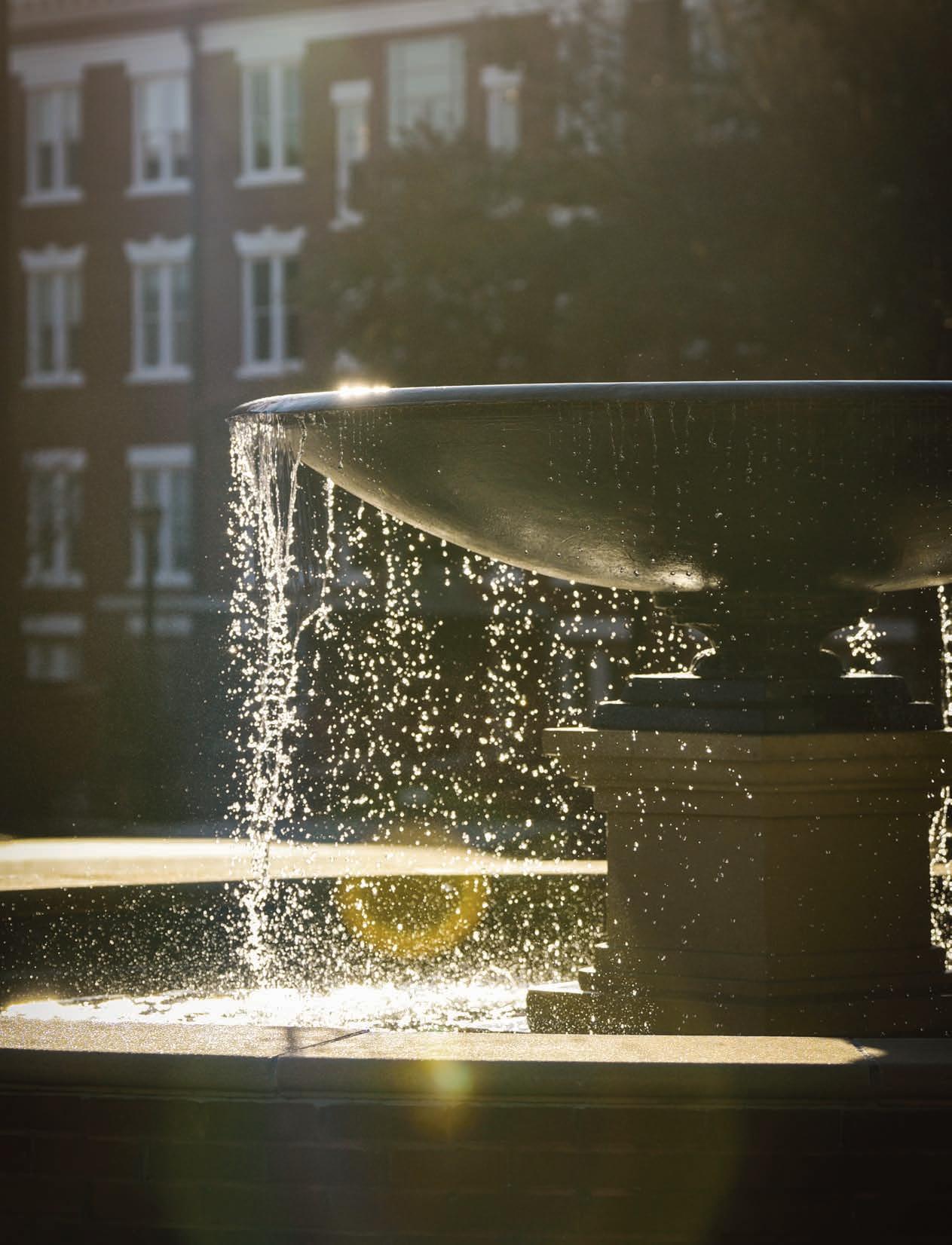
“He instilled that a medical career is demanding, challenging and requires my dedication, time and attention,” Al-Bayati said. “When I’m at the hospital for 30 hours at a time, think back to what he said, and it’s not different from what he predicted.”
This mentorship came full circle as Al-Bayati walked across the stage at the University of Miami to receive his medical degree with Saladin and his wife, Diane, cheering him on.
“I was grateful to have my professor there to personally invest in my success and wellbeing,” he said.
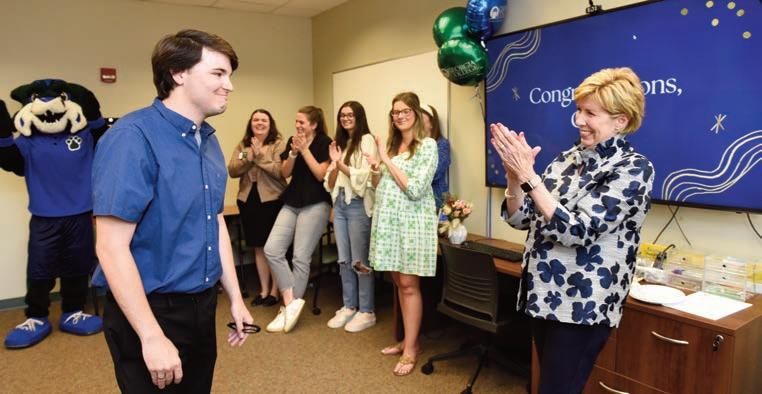
GCSU’s
First-Ever Truman Scholar: Colin Hall
Jones County native Colin Hall was awarded the prestigious Truman Scholarship in 2023, becoming GCSU’s first-ever Truman Scholar. The Truman Scholarship is awarded to aspiring leaders who are pursuing careers in public service.
In May, Hall attended the Truman Scholars Leadership Week in Liberty, Missouri. The conference led the senior political science major to decide what his next steps will be after graduation, when he not only receives his degree, but becomes the first GCSU student to complete the Certificate in Election Administration.
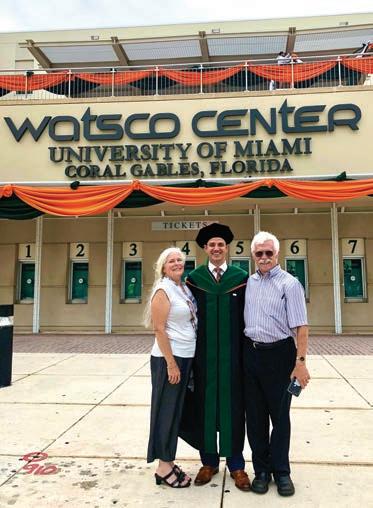

First to Earn an Ed.D. in Curriculum and Instruction
April Dockery and Daymond Ray are the first graduates of the GCSU Curriculum and Instruction Doctoral Program (C&I). Candidates in the Ed.D. C&I program acquire expertise in leading P12 curriculum design, development and evaluation in their fields of content specialization. The newly-minted Drs. Dockery and Ray were hooded by their dissertation chairs – Dr. Linda Bradley and Dr. Joe Peters, respectively – during the December 2023 Commencement ceremony.
2024 Truman Scholar Finalist: Axel Hawkins
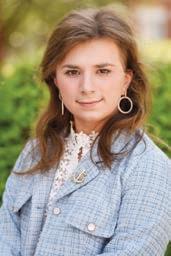

Hall plans to participate in the Truman Summer Institute Program, followed by TrumanAlbright, a year-long internship. Both programs provide the opportunity to work in Washington, D.C. with a member of the U.S. Senate or House of Representatives.
“These friendships I made through Truman Scholars are lifelong and I can’t wait to cross paths with these distinguished people in the future,” Hall said.
GCSU junior Axel Hawkins, a history major from McDonough, Georgia, was recently named a finalist in the 2024 Truman Scholarship competition. Hawkins will interview with the regional review panel in Atlanta on March 15; the Truman Scholarship Foundation will announce the Truman Scholar winners on April 19.
This year the Truman Foundation selected 191 applicants from a pool of 709. Only three schools from Georgia – Emory, the University of Georgia and GCSU – had students selected as finalists.
Hawkins currently serves as Vice President of the GCSU Student Government Association and was elected by her peers to serve as SGA President for the 2024-2025 school year.
GCSU professor becomes national go-to for AI in higher ed

These days, the subject of artificial intelligence is rife with questions.
Will this rapidly evolving technology take over, destroying jobs and shoving humans aside? How will it impact higher education?
Universities nationwide turn to Georgia College & State University’s Professor of Secondary Education Dr. Cynthia Alby for answers.
She started with a workshop on AI at Mercer University last January and has gone on to give more than 40 seminars throughout the United States. She was interviewed on “Teaching in Higher Ed,” a premier podcast, and is part of the University System of Georgia’s webinar series on AI.
Her recommendation: Go with the flow. Writing will change, but everyone can benefit from the use of AI.
Dr. Dockery is from Douglas, Georgia, and teaches in the Coffee County School System where she is a former Teacher of the Year. Dr. Ray serves as Principal at Hancock Central High School and is originally from Adel, Georgia.
“The message that try to put out there every time I’m asked to talk to anyone is, ‘You need to know about AI, and the only way to know about AI is to play with it. Read about it, work with it, use the tools available,’” Alby said. “It’s the only way. You just got to use it, even if you don’t want to, you still have to.”.”
Aflac donation will help fund GCSU mobile health clinic
$100,000 is on its way to support the creation of Georgia College & State University’s mobile health clinic, an initiative by the College of Health Sciences.
The money was donated by Aflac’s CareGrant, and presented by the President of their U.S. operations, Virgil R. Miller ’92. This marks the first Aflac CareGrant given in the state of Georgia, but more than $2 million has been awarded nationally.
Truist Bank has also donated $50,000 toward the cost of realizing the mobile clinic.
The mobile health clinic is an initiative borne out of the Georgia College Center for Health and Social Issues, directed by Dr. Damian Francis. Once established, the mobile clinic will provide screenings, as well as primary, maternal and obstetrical care to Baldwin and surrounding counties.
In addition, the College of Health Sciences will use the unit to extend its portfolio of experts into the community while providing field experiences and internship opportunities to Georgia College students.
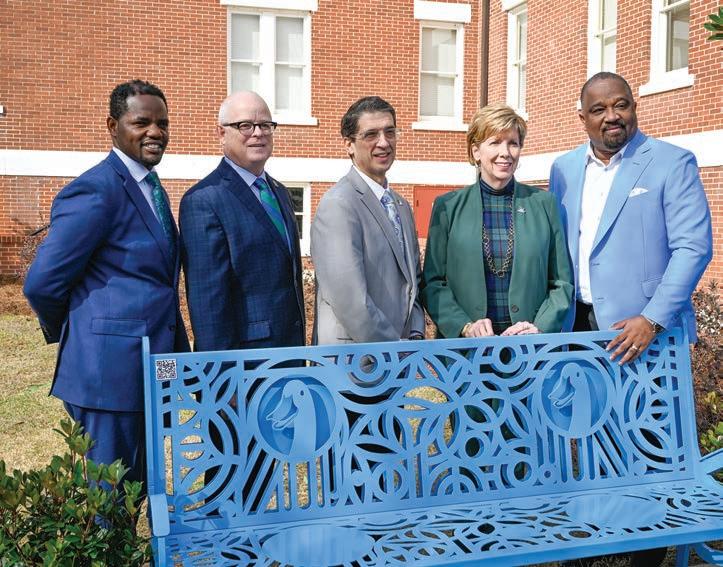
Dr.
Provost Costas Spirou, President Cathy Cox, Virgil Miller
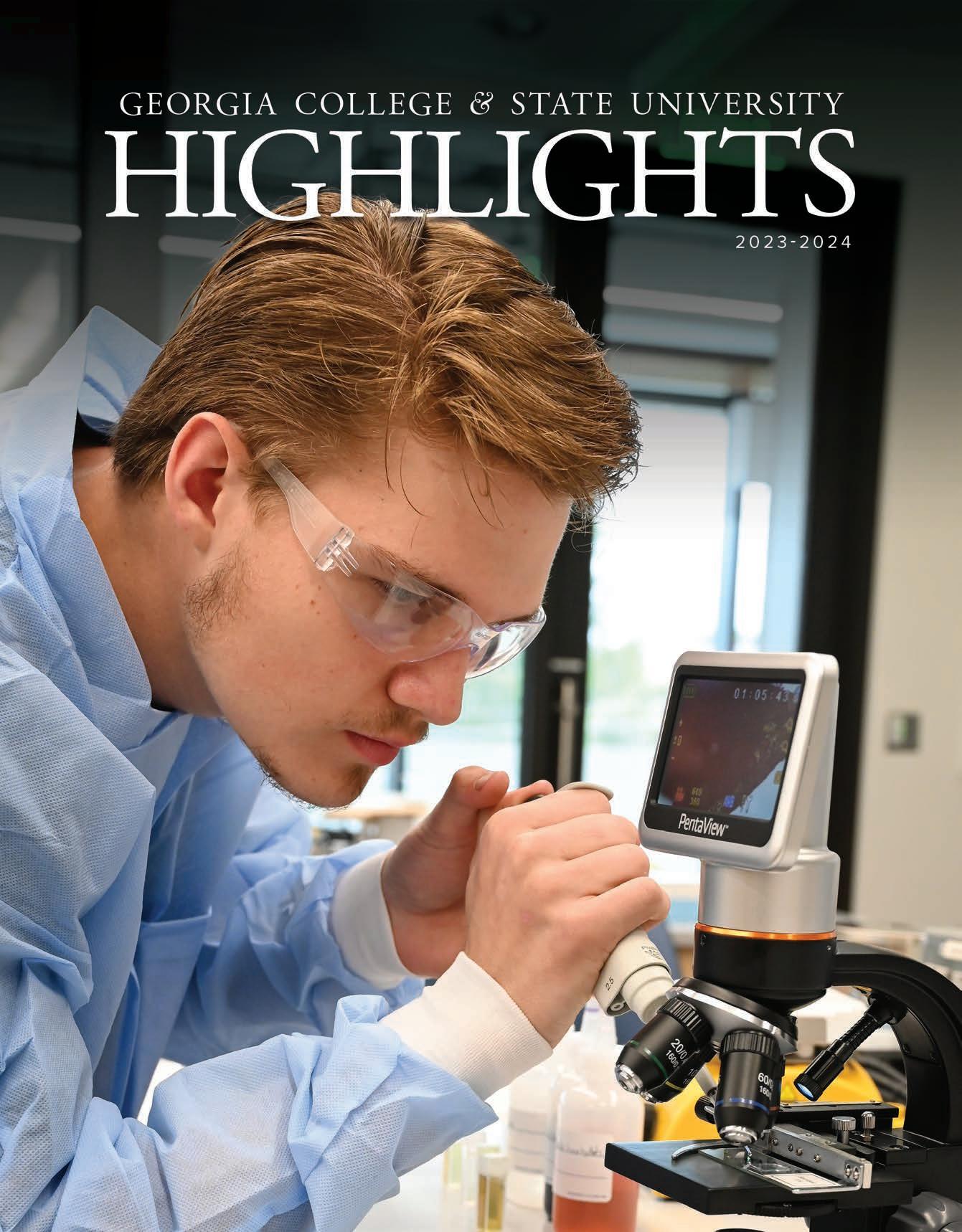 Damian Francis, director of the center for health and social issues, Dr. Will Evans, dean of the college of health sciences,
Damian Francis, director of the center for health and social issues, Dr. Will Evans, dean of the college of health sciences,
For the full version of these outstanding stories, scan the code www.gcsu.edu
Diane Saladin, Dr. Ahmed Al-Bayati and Dr. Ken Saladin

GCSU: a destination for undergraduate research
At Georgia College & State University, both undergraduate and graduate students are afforded the opportunity to work directly with professors – all considered leaders in their respective fields – on research projects in a variety of disciplines.
Funded through a $300,000 grant from the National Science Foundation (NSF), environmental science professor Dr. Samuel Mutiti and his students are researching plants that may have the power to renew vast stretches of land poisoned from mining in the central-southern region of Africa. The threeyear program includes experiences for students in the summers, plus continuing research during academic years on campus. It builds upon years of study by Dr. Mutiti, who has worked tirelessly to clear Zambian soils of toxic metals. The group has researched and implemented plants that are known to pull pollutants from soil into their roots and stems.

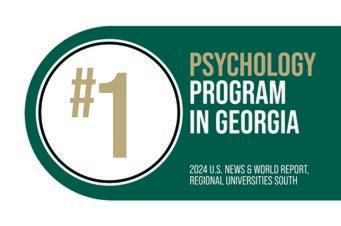
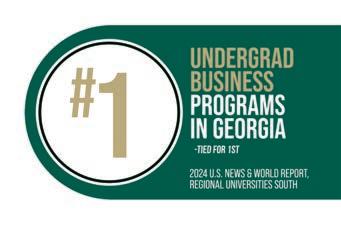

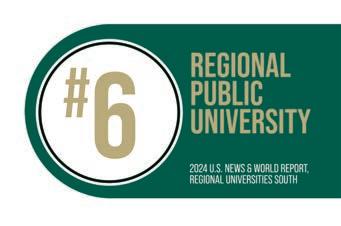
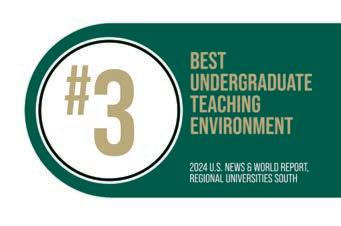

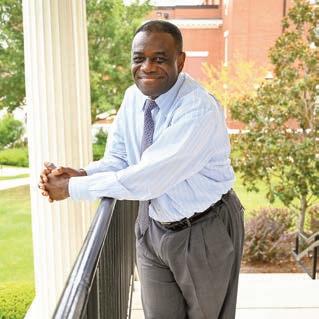
Students have joined ecologist Dr. Bruce Snyder in researching millipedes in Georgia. More than 13,600 species of millipede have been described worldwide, but only about 110 in Georgia. He and graduate student Lance Andrew are creating a species list and map and in the last few years, Andrew has discovered about seven new species of millipede on his own. “I’ve got this thing that science has never encountered before, right here under my microscope,” Andrew said. “And then the second one happened and the third and the fourth, fifth, sixth.”

An associate professor of public health, Dr. Ernest Kaninjing is part of a global effort to understand why Black men of different ethnicities experience worse prostate cancer outcomes. His research is particularly relevant to Milledgeville-Baldwin County, where 42% of the population identify as Black or African American. For the last five years, he’s worked with Georgia College students and residents to discover what’s causing these differences in survivorship for Black men and what healthcare providers can do to stop it.
Students in the Biology and Environmental Sciences have numerous opportunities to experience hands-on cutting edge research, that provide them the skills of analytical and critical thinking, collaborations, and communication skills. All of these are hallmarks of our GC Journeys.
Dr. Indiren Pillay, Biological & Environmental Sciences
 GCSU Biology graduate students Andrew Lance and Elena Cruz rummage through dead leaves and rotted logs to find millipedes for their research.
Dr. Ernie Kaninjing
GCSU Biology graduate students Andrew Lance and Elena Cruz rummage through dead leaves and rotted logs to find millipedes for their research.
Dr. Ernie Kaninjing
RECIPIENT OF AASCU’S 2023
OUR CLASSES HAVE LESS
50 STUDENTS 98% For the full version of these outstanding stories, scan the code www.gcsu.edu
Dr. Mutiti doing field work with a GCSU undergrad student in Zambia.
OF
THAN









 Damian Francis, director of the center for health and social issues, Dr. Will Evans, dean of the college of health sciences,
Damian Francis, director of the center for health and social issues, Dr. Will Evans, dean of the college of health sciences,










 GCSU Biology graduate students Andrew Lance and Elena Cruz rummage through dead leaves and rotted logs to find millipedes for their research.
Dr. Ernie Kaninjing
GCSU Biology graduate students Andrew Lance and Elena Cruz rummage through dead leaves and rotted logs to find millipedes for their research.
Dr. Ernie Kaninjing